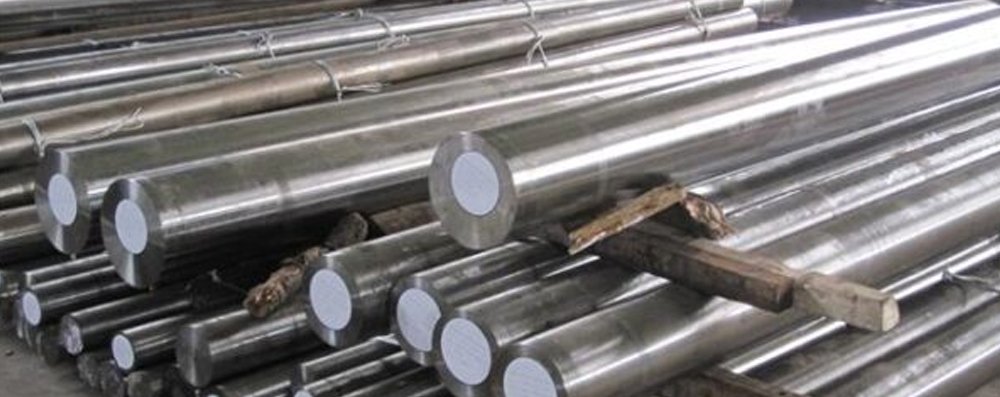Introduction
DIN 1.2343 is a chromium-molybdenum-vanadium alloyed hot work tool steel, comparable to H11 steel, recognized for its excellent toughness, good resistance to thermal fatigue cracking (heat checking), and high-temperature strength. It is particularly suited for hot work applications where both toughness and resistance to repeated heating/cooling cycles are critical
Uses/Applications:
- Die casting dies for aluminum and magnesium alloys
- Hot extrusion dies
- Forging dies
- Die inserts
- Pressure die casting tooling
- Mandrels
- Hot shear blades
- Ejector pins and sleeves
- High-performance plastic molding tools requiring high toughness
- Aircraft landing gear components
Properties of the Grade:
- Excellent toughness and ductility
- Good hot strength and wear resistance
- High resistance to thermal fatigue and heat checking
- Good resistance to tempering
- Good machinability in the annealed condition
- Excellent hardenability
- Air or oil hardenable
- Good dimensional stability during heat treatment
Chemical Composition:
| Element | Content (%) |
| Carbon (C) | 0.32 – 0.42 |
| Chromium (Cr) | 4.80 – 5.50 |
| Molybdenum (Mo) | 1.10 – 1.30 |
| Vanadium (V) | 0.25 – 0.50 |
| Manganese (Mn) | 0.20 – 0.50 |
| Silicon (Si) | 0.80 – 1.20 |
| Phosphorus (P) | ≤ 0.030 |
| Sulfur (S) | ≤ 0.030 |
Mechanical Properties:
(Typical values after heat treatment)
| Property | Typical Value |
| Hardness (Annealed) | ~ 190 – 230 HB |
| Hardness (Hardened) | 48 – 52 HRC |
| Tensile Strength | ~ 1350 – 1450 MPa |
| Yield Strength | ~ 1100 – 1200 MPa |
| Elongation | ~ 12% |
| Impact Toughness (Charpy V-notch) | High |
The balance of Cr-Mo-V provides high-temperature strength and thermal shock resistance.
Physical Properties:
| Property | Typical Value |
| Density | ~ 7.80 g/cm³ |
| Modulus of Elasticity (E) | ~ 210 GPa |
| Thermal Conductivity (20°C) | ~ 24 W/m·K |
| Specific Heat Capacity | ~ 460 J/kg·K |
| Coefficient of Thermal Expansion (20-100°C) | ~ 11.5 × 10⁻⁶ /°C |
Forging:
Forging Temperature Range: 1050°C – 1150°C
Procedure:
- Preheat slowly to 850°C – 900°C.
- Forge at 1050°C – 1150°C.
- Do not forge below 850°C.
- Cool slowly in furnace or sand to avoid internal stresses.
Heat Treatment:
- Annealing:
- Heat to 820°C – 850°C.
- Hold for several hours.
- Furnace cool slowly to around 600°C.
- Obtain a hardness of ~ 190 – 230 HB.
- Stress Relieving:
- Heat to 600°C – 650°C after heavy machining.
- Hold for 1-2 hours and cool in still air.
- Hardening:
- Preheat in two stages: 600°C – 650°C and 850°C – 900°C.
- Austenitize at 1000°C – 1040°C.
- Quench in air or oil depending on section size.
- Tempering:
- Temper immediately after quenching.
- Tempering temperature: 500°C – 650°C based on required hardness.
- Double or triple tempering is recommended.
Dimensional Tolerances:
- Hot rolled bars: per EN 10060 standards
- Bright bars: h9, h11 tolerance classes, depending on requirement
- Ground bars: fine tolerances available
- Custom dimensions available on request for specific tool applications
Machinability:
- Good machinability in the annealed condition.
- Machining becomes more difficult after hardening.
- Suitable for conventional machining methods using high-speed steel or carbide tools.
Corrosion Resistance:
- Moderate corrosion resistance in dry conditions.
- Not intended for use in corrosive environments without protective coatings.
- Surface treatments such as nitriding can enhance corrosion resistance.
Weldability:
- Fair weldability with correct precautions.
- Preheating to 300°C – 400°C is recommended before welding.
- Use matching filler materials.
- Post-weld heat treatment required to restore mechanical properties.
Available Form:
DIN 1.2343 tool steel is available in:
- Round Bars
- Flat Bars
- Forged Blocks
- Plates
- Precision Ground Bars
- Custom cut sizes upon request
Available in annealed or hardened/tempered conditions as per customer needs.
Conclusion:
DIN 1.2343 is a versatile hot work tool steel offering an excellent combination of toughness, thermal fatigue resistance, and high-temperature strength. Its properties make it a go-to material for tooling subjected to repeated heating and cooling cycles, as seen in die casting and forging industries. Proper heat treatment ensures long life and reliable performance under extreme working conditions.
Related Products : D2, DB6, DIN 1.2714, DIN 1.2080, DIN 1.2379, DIN 1.2343, DIN 1.2344, EN31, H11, H13, OHNS, HCHCR, M2, P20+S, P20, P20+Ni, K310, Maps


